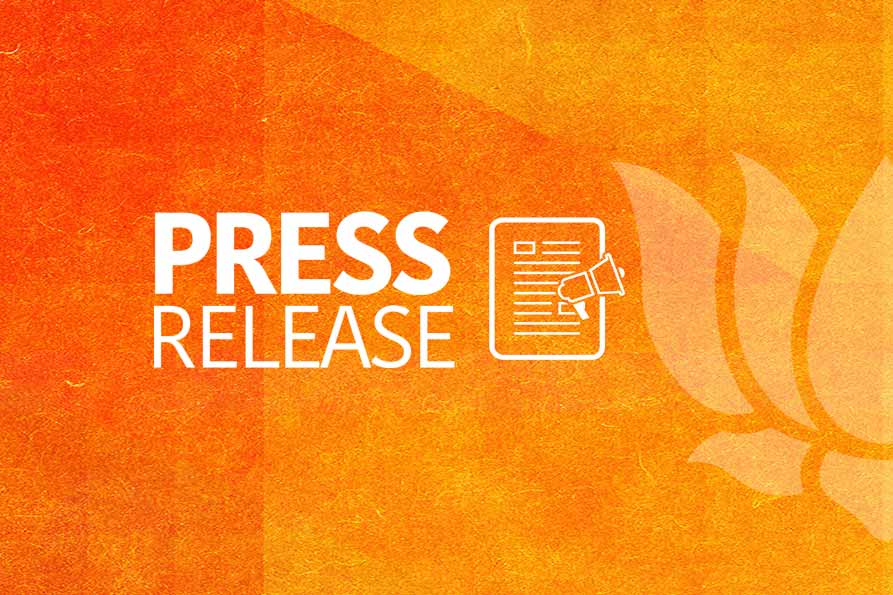
Press Statement issued by Shri L.K. Advani
Leader of the Opposition (Lok Sabha)
At a press conference in Rajnandgaon (Chhattisgarh)
on April 22, 2006
|
I am pleased to be in Chhattisgarh in the course of the 35-day Bharat Suraksha Yatra, which I have undertaken jointly with my Party President Shri Rajnath Singh. I was touched by the rousing welcome accorded to the Yatra yesterday at the border between Maharashtra and Chhattisgarh, and also all along the way to Rajnandgaon.
I warmly compliment Chief Minister Dr. Raman Singh and his colleagues for the remarkable strides made by the state in the short period since the formation of the BJP government in October 2004. I am told about the government's success in record rice procurement, which has helped the farmers in the state, and an impressive surge in investments, which will propel the state's industrial and economic growth. I am especially heartened to know about Chhattisgarh topping the performance list in the construction of rural roads under the Pradhan Mantri Gram Sadak Yojana (launched by the Vajpayee government), its achievements in rural sanitation, promotion of primary education (particularly girls’ education) and its priority attention to tribal welfare.
All this shows the BJP's commitment to Sushasan (good governance) and Vikas (development), which our party is proud to have brought to the centrestage of national discourse. We showed the same commitment in the Vajpayee government's six-year rule at the Centre. I urge Dr. Raman Singh and his colleagues to further intensify their efforts to promote Sushasan and Vikas, and make Chhattisgarh a model for other states to emulate.
One of the principal aims behind the BJP's commitment to smaller states is that they are better suited to promote good governance and development, and thus fulfill the aspirations of the people. This is why we took the initiative to establish Chhattisgarh, Jharkhand and Uttaranchal as separate states.
The greatest hurdle to Chhattisgarh's rapid and all-round development comes from naxal groups, who, as Prime Minister Dr. Manmohan Singh recently admitted at a chief ministers’ conference, also poses the "biggest threat to India's internal security". The Prime Minister also, for the first time, expressed the need for a "unified command" to tackle the naxal menace, which is now spreading all along the 'Red Corridor' from Nepal border to Karnataka.
I have welcomed the Prime Minister's proposal for a "unified command" involving coordination between the Centre and naxalite-affected states. However, I am surprised as to why the UPA government dismantled the unified and coordinated Centre-state strategy that the NDA government had evolved way back in 1999.
I am also surprised that no spokesman of the government or the Congress party has so far satisfactorily explained how the Prime Minister's declaration of "no compromise with naxalism" squares up with the policy of total compromise with naxalism adopted by the Congress government in AP two years ago. It is my charge that the soft approach adopted by the Congress party and the AP government has strengthened the naxalites and also given them respectability. It is not hidden from anybody that the Congress adopted this soft approach purely for narrow electoral considerations in the 2004 Lok Sabha and Vidhan Sabha polls.
The Union government must now follow up on the decisions taken at the Chief Minister's conference and mount an effective assault on the naxal problem. Since, the Prime Minister has called it "the biggest threat to India's internal security", I would like him to take Parliament into confidence, in the forthcoming second part of the Budget session, on how his government plans to deal with a threat of this magnitude.
I believe that, in addition to firm action by security forces, efforts must be stepped up to promote good governance, combined with rapid socio-economic development with people's participation, in the naxalite-affected areas.
The political scene in Nepal is rapidly changing. King Gyanendra has announced that executive power would be restored to political parties. In the context of India's policy on Nepal, I urge the government to ensure that Maoists in that country are completely isolated. This is necessary from the standpoint of tackling the naxal menace in our own country.
To Write Comment Please लॉगिन



.gif)





